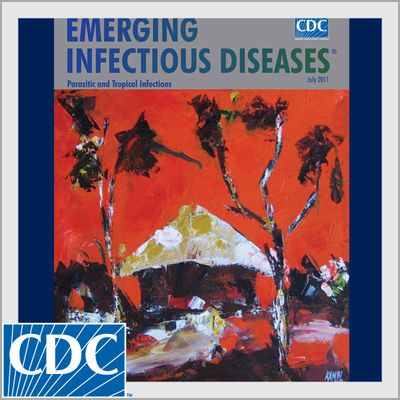A podcast highlighting key articles in the current issue of Emerging Infectious Diseases, a journal from the Centers for Disease Control and Prevention (CDC).
https://wwwnc.cdc.gov/eid/
Gesamtlänge aller Episoden: 6 days 1 hour 49 minutes
Determining the Quality of Oseltamivir (Tamiflu)
The possibility of an avian flu pandemic has given Tamiflu attention. Because of fear of a pandemic, this drug has been in high demand. Unfortunately, this demand has prompted production of counterfeit Tamiflu. CDC's Dr. Mike Green discusses a test that is simple and affordable and can test the quality of products purported to be oseltamivir (Tamiflu).
Dengue Fever Seroprevalence and Risk Factors, Texas-Mexico Border, 2004
Dengue fever is both endemic and underrecognized along a section of the southern Texas–Mexico border, and low income is a primary risk factor for infection. As part of a special section on Global Poverty and Human Development, Dr. Joan Marie Brunkard discusses a dengue seroprevalence survey in this region and what can be done to help prevent infection and to identify and treat those who are infected.
Increase in Clostridium difficile-related Mortality Rates, United States, 1999-2004
Deaths related to Clostridium difficile are on the rise in the United States. Matthew Redelings from the Los Angeles County Department of Health discusses the increase and what can be done to prevent this infection.
Brazilian Vaccinia Viruses and Their Origins
Smallpox was eradicated more than 25 years ago, but live viruses used in vaccines may have survived to cause animal and human illness today. Dr. Inger Damon, Acting Branch Chief of the Poxvirus and Rabies Branch at CDC, discusses efforts to determine origins and spread of vaccinia viruses in Brazil.
Strategies to Reduce Person-to-Person Transmission During Widespread Escherichia coli O157:H7 Outbreak
US consumers were warned not to eat raw spinach during a 2006 E. coli O157:H7 outbreak, but additional warnings about person-to-person transmission could have reduced bacteria spread. Dr. Martin Meltzer discusses the research methods and findings and the authors' success in presenting them clearly and accurately.
Pet Rodents and Fatal Lymphocytic Choriomeningitis in Transplant Patients
Three organ transplant recipients died from infection with lymphocytic choriomeningitis virus (LCMV), which was traced back to a hamster owned by the daughter of the organ donor. Dr. Brian Amman, a mammalogist with the Special Pathogens Branch at CDC, discusses the dangers LCMV may pose to people with immune disorders, as well as to pregnant women.
Human Benefits of Animal Interventions for Zoonosis Control
Industrialized countries have contained recent zoonotic disease outbreaks, but countries with limited resources cannot respond adequately. Dr. Nina Marano, veterinarian and Chief, Geographic Medicine and Health Promotion Branch, CDC, comments on the focus on animal reservoirs to prevent outbreaks in developing nations.
Emergence of Extensively Drug Resistant Tuberculosis
Extensively drug-resistant tuberculosis (XDR TB) outbreaks have been reported in South Africa, and strains have been identified on 6 continents. Dr. Peter Cegielski, team leader for drug-resistant TB with the Division of Tuberculosis Elimination at CDC, comments on a multinational team's report on this emerging global public health threat.
Insecticide Resistance Reducing Effectiveness of Malaria Control
Malaria prevention is increasingly insecticide based. Dr. John Gimnig, an entomologist with the Division of Parasitic Diseases, CDC, discusses evidence that mosquito resistance to insecticides, which is measured in the laboratory, could compromise malaria prevention in the field.
Spread of Rare Fungus from Vancouver Island
Cryptococcus gattii, a rare fungus normally found in the tropics, has infected people and animals on Vancouver Island, Canada. Dr. David Warnock, Director, Division of Foodborne, Bacterial, and Mycotic Diseases, CDC, discusses public health concerns about further spread of this organism
